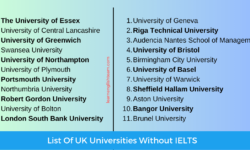CKA Exam Overview: Structure, Syllabus, and Certification Benefits
The Certified Kubernetes Administrator (CKA) certification is a highly sought-after credential for IT professionals seeking to validate their expertise in Kubernetes administration. The CKA certification has grown significantly in importance in the market as Kubernetes becomes the de facto standard for container orchestration. In this article, we will provide an in-depth overview of the CKA exam, including its structure, syllabus, and the numerous benefits of earning this prestigious certification.

Getting to Know the CKA Certification
The CKA certification is designed and maintained by the Cloud Native Computing Foundation (CNCF), a leading organization in cloud-native technologies. It aims to validate an individual’s skills in designing, deploying, configuring, and managing Kubernetes clusters. The certification demonstrates the candidate’s ability to handle real-world challenges in Kubernetes administration and ensures that they possess the necessary skills to maintain Kubernetes clusters efficiently.
CKA Exam Questions Structure
The CKA exam is a rigorous hands-on assessment that evaluates the candidate’s practical knowledge of Kubernetes administration. It is a performance-based exam conducted in a live environment, where candidates are given access to a real Kubernetes cluster to perform various tasks. The Linux Foundation certstopics.com is three hours long, during which candidates must complete a series of practical challenges. The passing score for the CKA exam is 74%, indicating the high level of proficiency required to earn the certification.
Online courses and practice exams are valuable resources for effective Certified Kubernetes Administrator (CKA) exam preparation. Enroll in reputable online courses that cover the CKA exam curriculum comprehensively. These courses provide in-depth knowledge and hands-on practice with Kubernetes concepts and tasks. Additionally, practicing with CKA practice exams simulates the real exam environment, allowing candidates to assess their readiness, identify areas for improvement, and gain confidence in their abilities.
CKA Exam Syllabus Dumpsbuddy
The CKA exam syllabus covers a comprehensive range of topics that are essential for Kubernetes administrators. Some of the key areas included in the syllabus are as follows:
Core Concepts: Understanding Kubernetes architecture, components, and key features.
API Primitives: Working with pods, services, deployments, and other Kubernetes resources.
Cluster Setup: Deploying and configuring Kubernetes clusters.
Application Lifecycle Management: Managing applications using ReplicaSets, Deployments, and other resources.
Cluster Maintenance: Upgrading and maintaining Kubernetes clusters.
Troubleshooting: Identifying and resolving common issues in Kubernetes clusters.
Security: Implementing security measures and best practices in Kubernetes.
It is crucial for candidates to thoroughly study and gain hands-on experience with each topic to excel in the CKA exam.
Certification Benefits
Earning the CKA certification offers numerous benefits for IT professionals and organizations alike:
Industry Recognition: The CKA certification is globally recognized as a standard for Kubernetes expertise. Holding this certification demonstrates the candidate’s commitment to staying current with the latest trends and best practices in Kubernetes administration.
Career Advancement: CKA-certified professionals enjoy enhanced career opportunities and are often sought after by top employers. The certification provides a competitive edge in the job market, as organizations prioritize certified Kubernetes administrators to manage their containerized applications.
Increased Productivity and Efficiency: The CKA certification equips professionals with the skills to efficiently manage Kubernetes clusters, leading to increased productivity and better utilization of cloud-native technologies.
Validation of Skills: Achieving the CKA certification validates the candidate’s hands-on skills and practical knowledge of Kubernetes administration. It proves their ability to handle complex Kubernetes tasks in real-world scenarios.
Contribution to Organizations: CKA-certified administrators can contribute significantly to organizations by ensuring smooth operations of containerized applications and enhancing their DevOps practices.
CNCF Affiliation: The CKA certification is backed by the CNCF, a leading authority in cloud-native technologies. The certification demonstrates alignment with industry standards and best practices.
Preparation Strategies for CKA Dumps
Attaining success in the Certified Kubernetes Administrator (CKA) certification exam marks a monumental milestone. It showcases an individual’s mastery within the realm of Kubernetes administration and orchestration. Aspirants pursuing this accolade often turn to established resources like marks4sure.com, a renowned platform lauded for its comprehensive study guide and practice exam provisions. The study guide delves deep into the core tenets of Kubernetes, systematically unraveling the intricacies of containerization, deployment, scaling, and management. Supported by intricate explanations and real-world instances, candidates navigate through complex subject matters with clarity and unwavering confidence. You can find free CKA Exam Questions Answers here.
An integral aspect of the preparatory journey involves active engagement with practice exams offered by marks4sure.com. These meticulously curated practice exams mirror the format and rigor of the actual CKA exam. They also encompass a diverse array of detailed questions and corresponding answers. Beyond mere readiness asse ssment, the interaction with these practice exams acquaints candidates with the exam environment, enhancing their adeptness in time management and adept problem-solving. As candidates meticulously navigate through these simulated scenarios, they refine their understanding of Kubernetes intricacies and optimize their performance, strategically preparing for the real certification examination. The amalgamation of the comprehensive study guide and practice exams from marks4sure.com empowers candidates with knowledge, assurance, and a systematic approach vital for conquering the CKA certification exam and elevating their expertise in Kubernetes administration.
Conclusion
The CKA certification is a powerful testament to a professional’s expertise in Kubernetes administration. Understanding the exam structure and syllabus is crucial to excel in the rigorous hands-on assessment. The benefits of earning the CKA certification are far-reaching, offering career advancement, industry recognition, and increased productivity. By employing effective preparation strategies, IT professionals can confidently take on the CKA exam. And become recognized Kubernetes administrators in the rapidly evolving cloud-native landscape.



